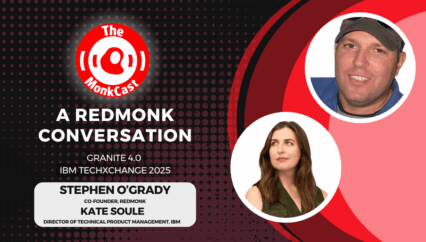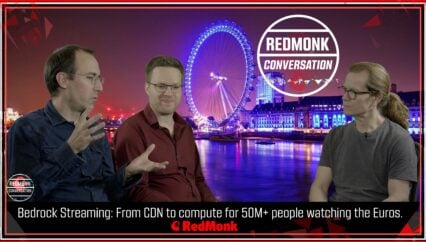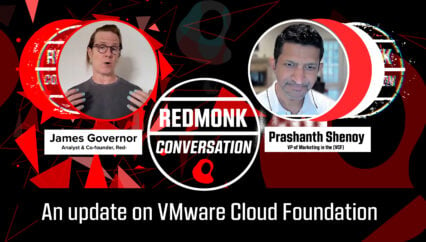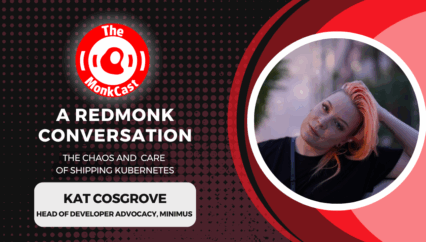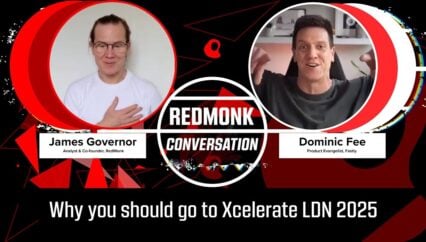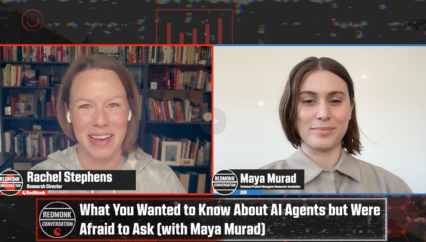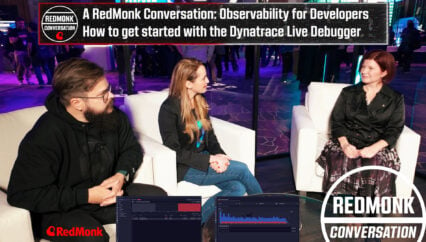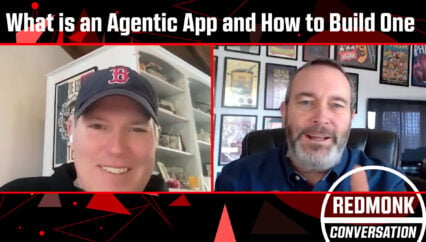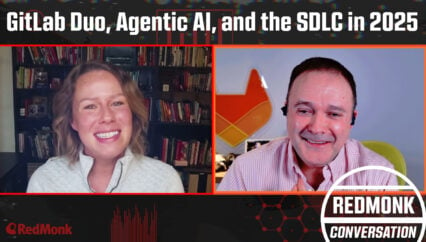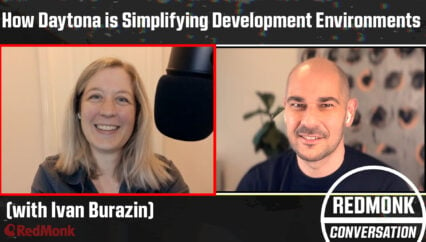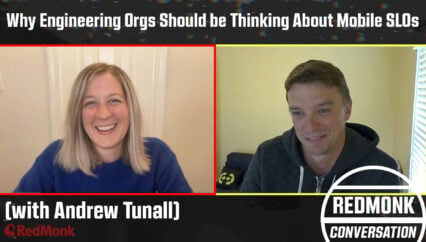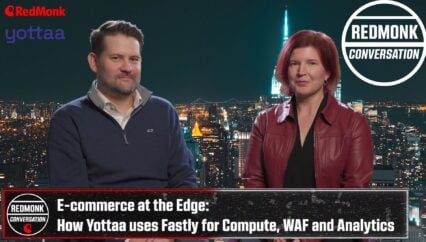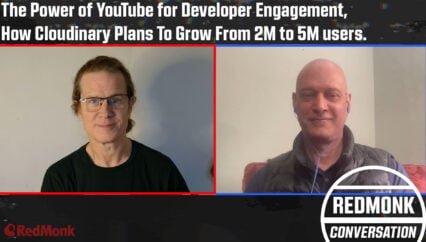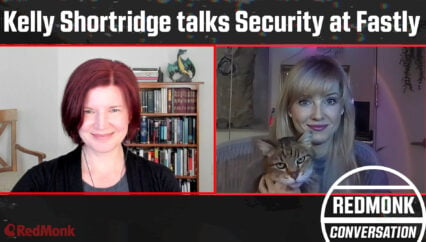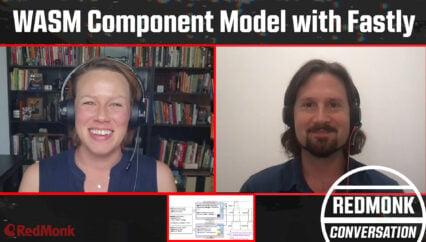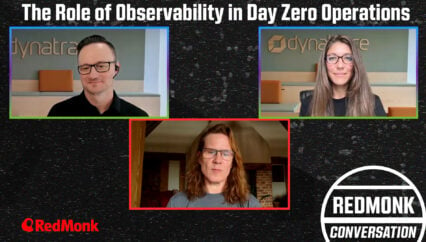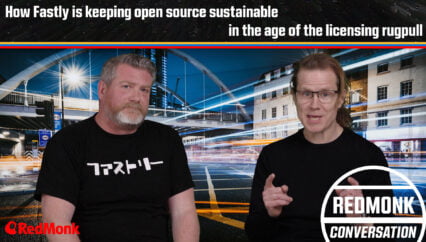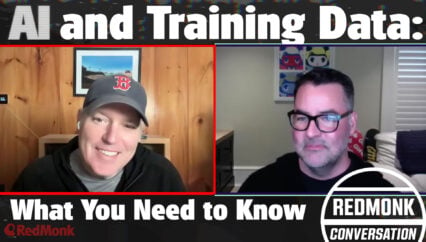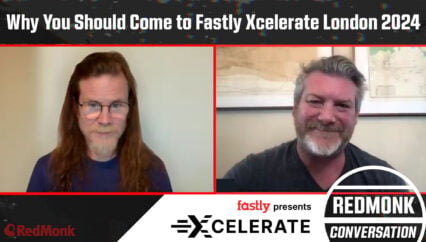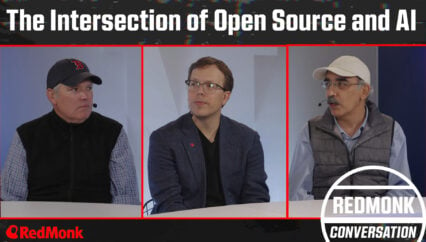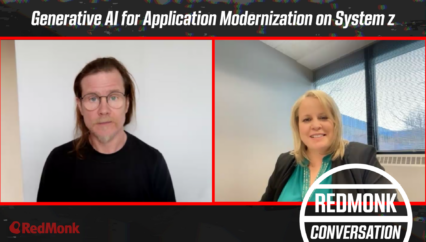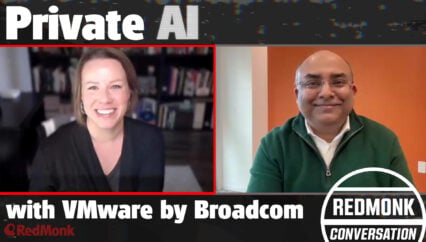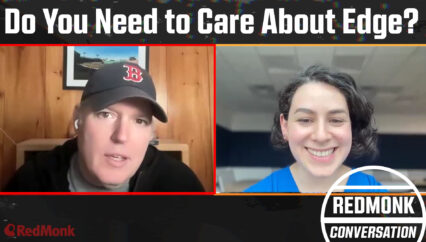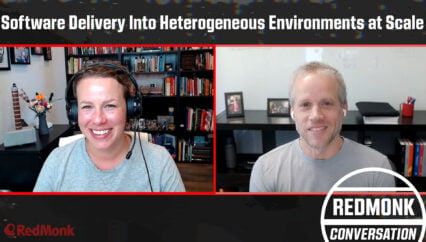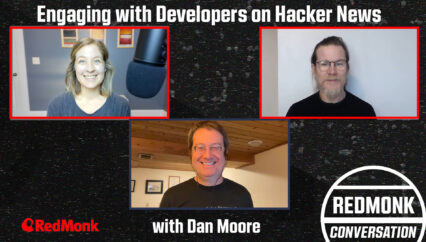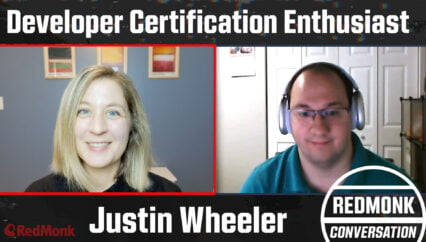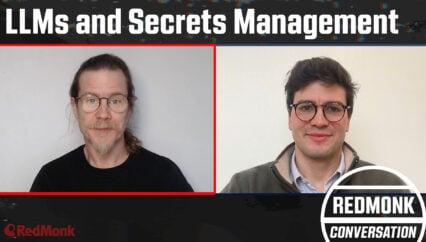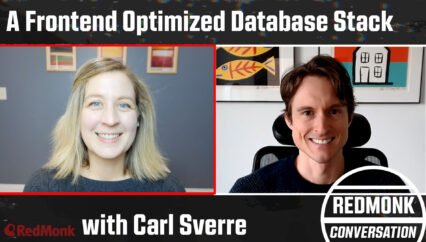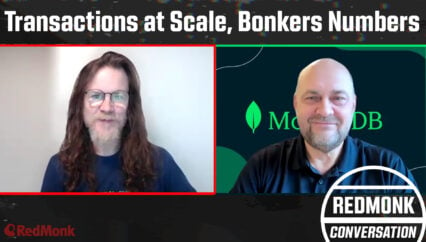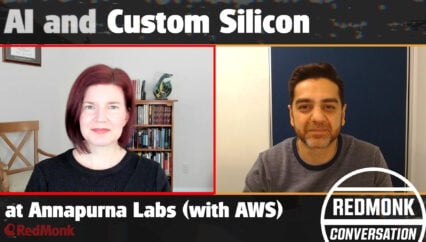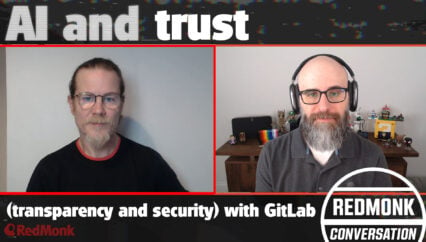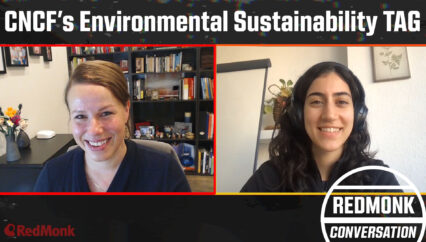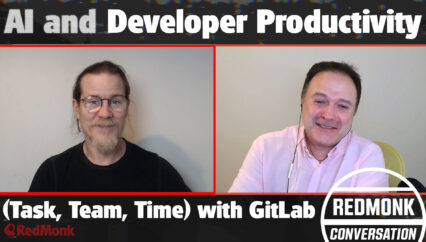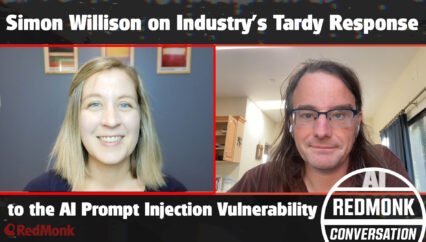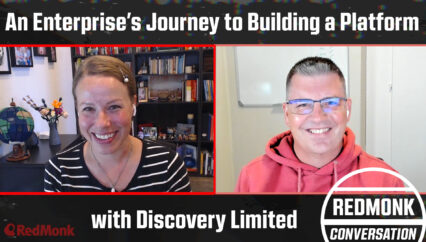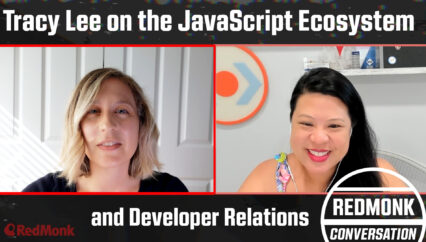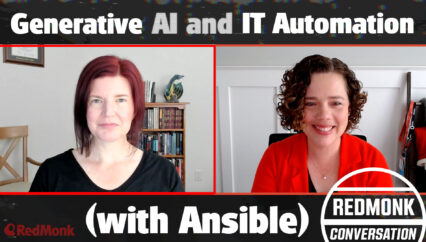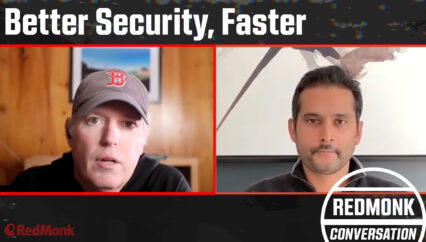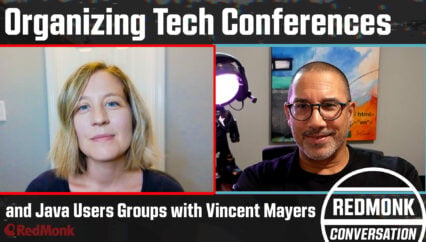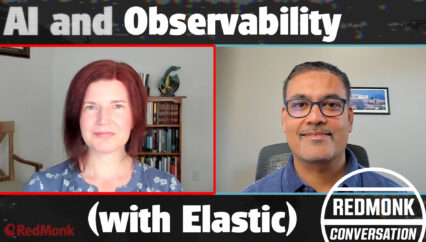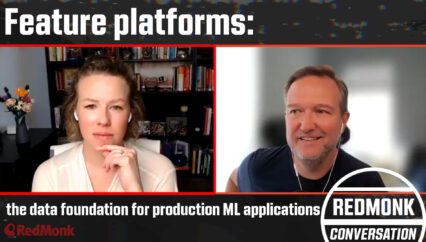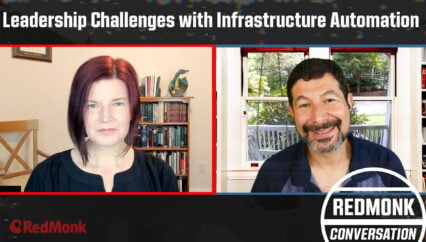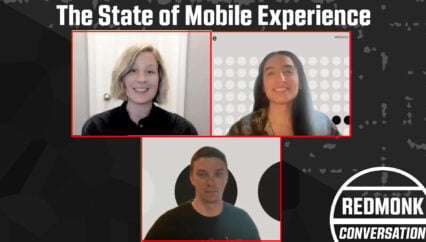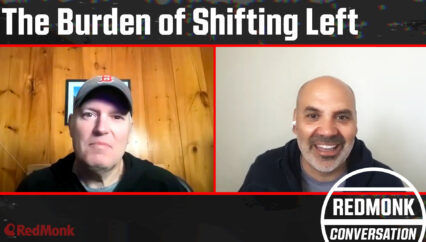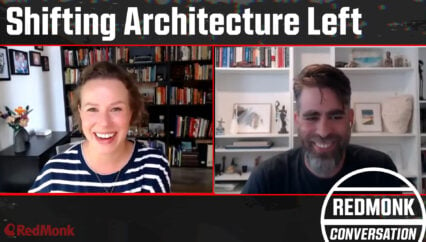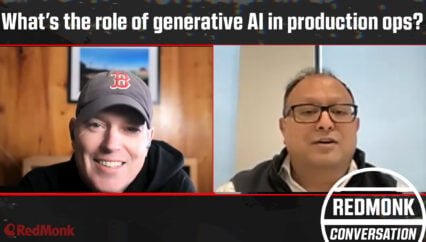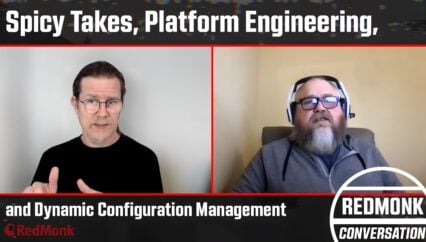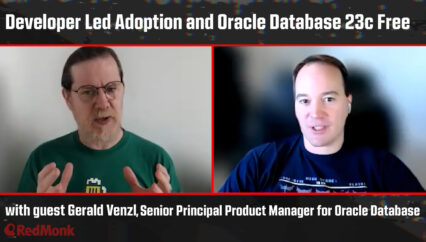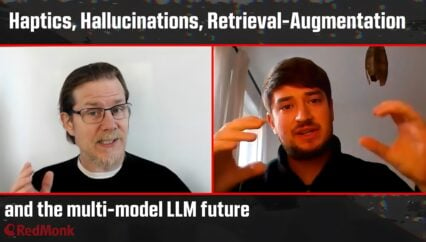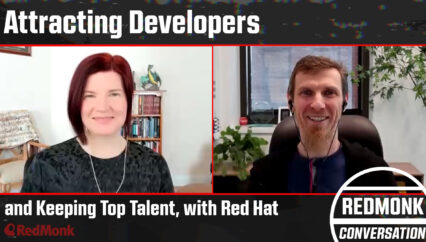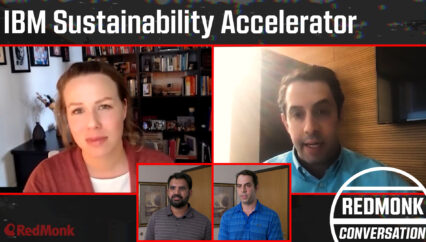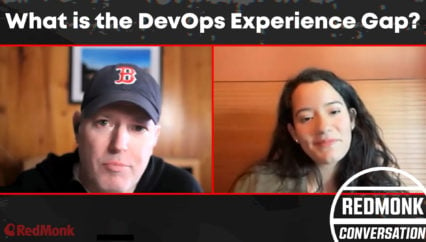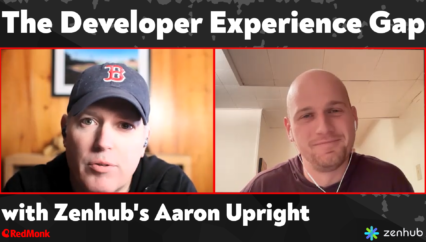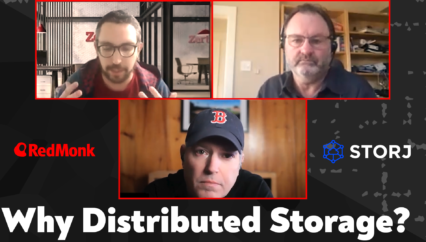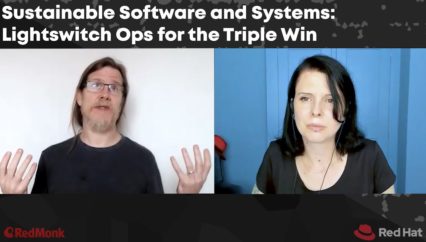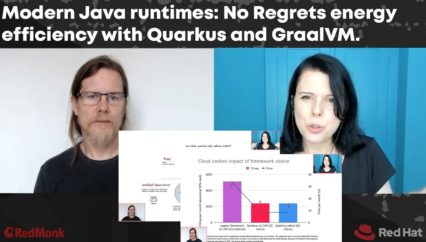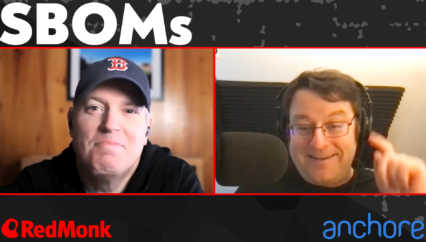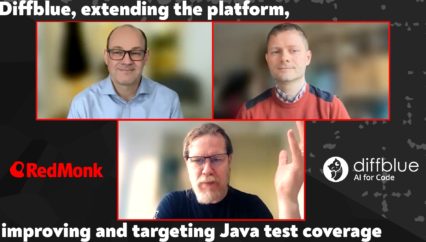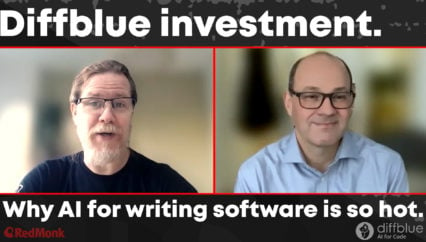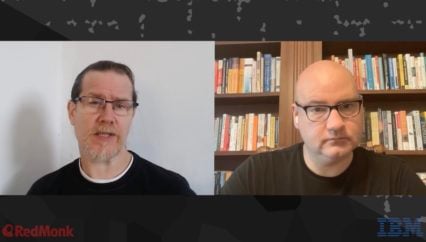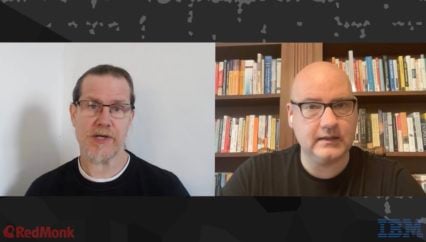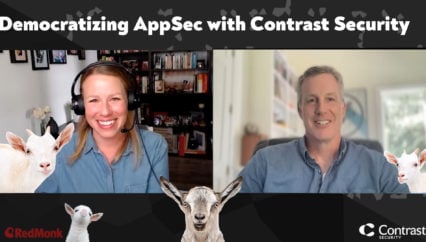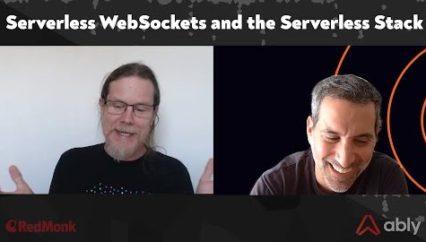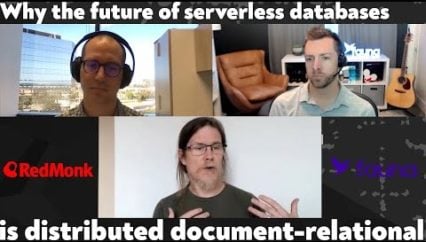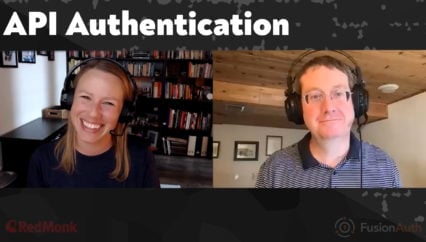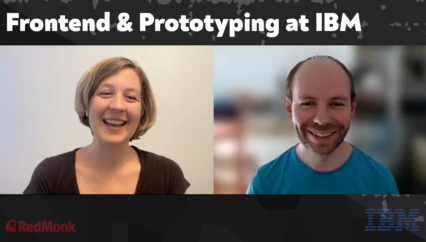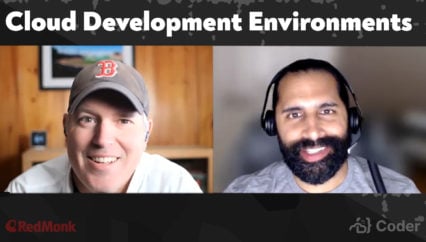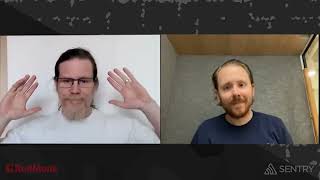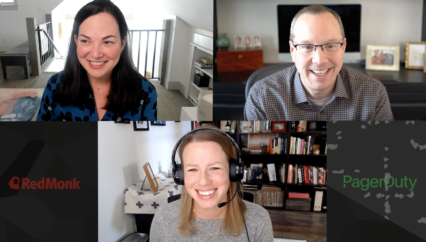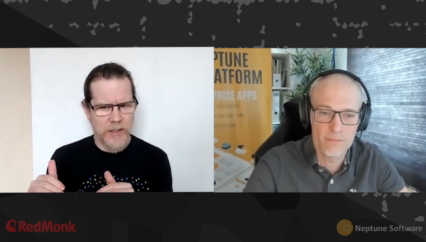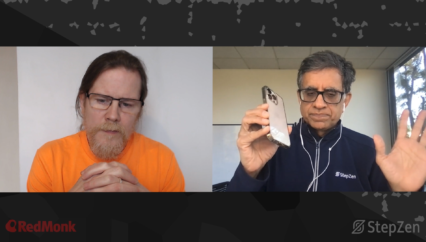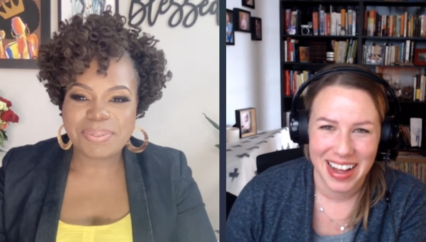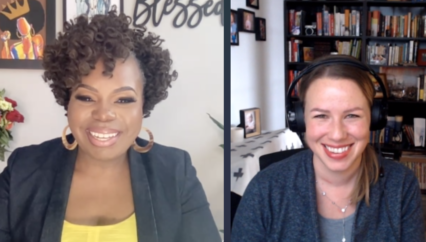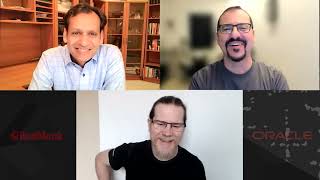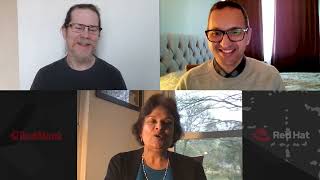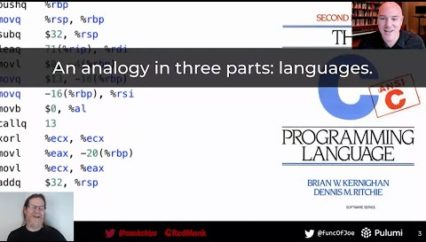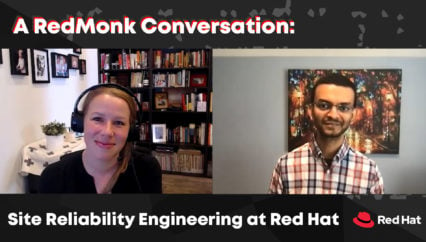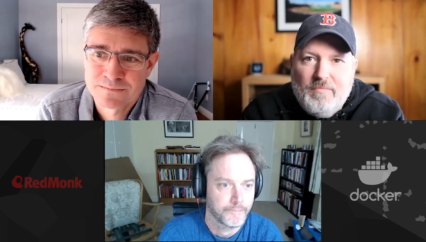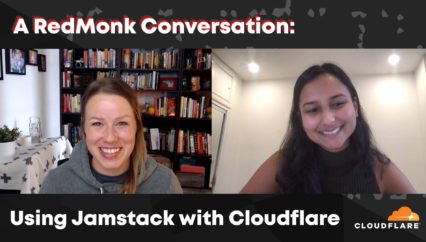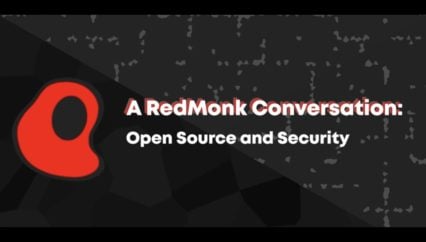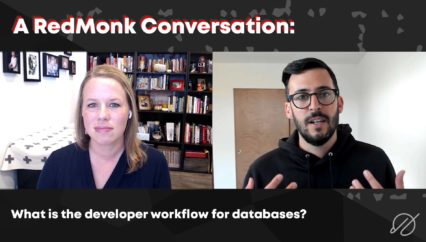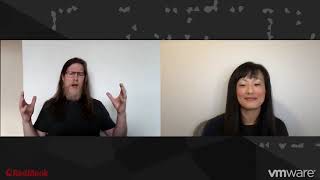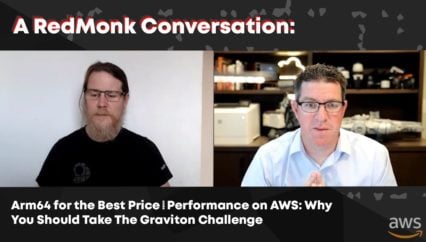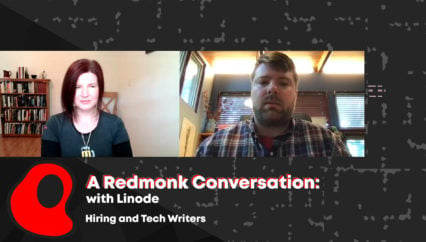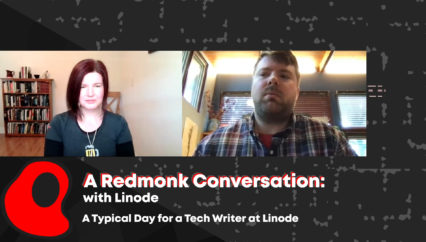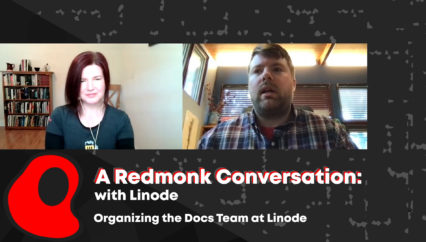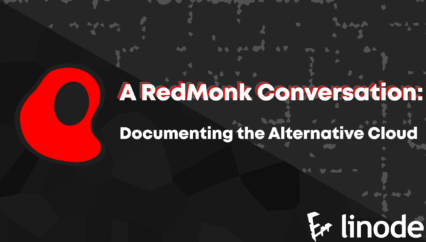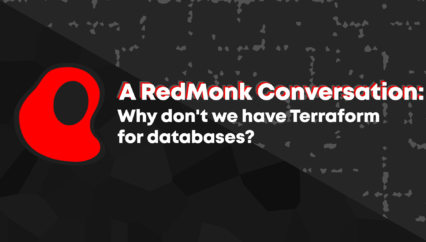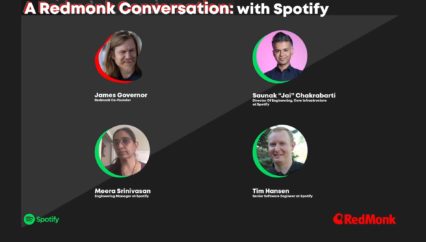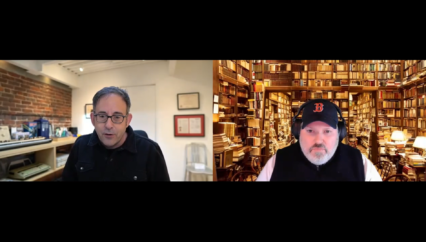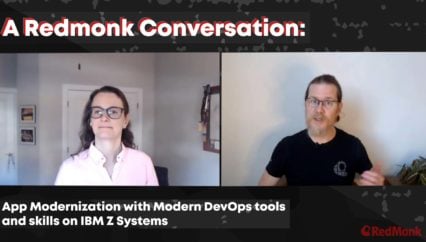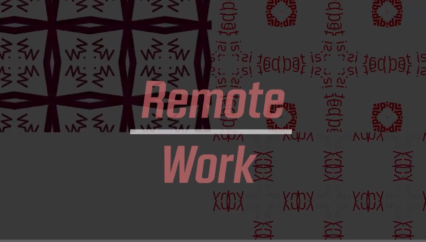Transcript
KellyAnn Fitzpatrick: Hello and welcome. This is KellyAnn Fitzpatrick from RedMonk. It is November of 2020 and we have KubeCon + CloudNativeCon North America 2020 just around the corner. With me today is Constance Caramanolis, who is a Principal Software Engineer at Splunk and also one of the co-chairs of KubeCon + CloudNativeCon. Today, we’re here to talk a little bit about the event itself, a lot about what it means to actually be a co-chair, and if we’re lucky at all, we will talk a bit about the increasing importance of puppies in virtual tech events. So to start us off, Constance, can you tell us a little bit about yourself and maybe your day job at Splunk?
Constance Caramanolis: Yeah, so my day job at Splunk. My day job at Splunk is a little bit odd. It’s not, I guess I would say traditional engineer, because I tend to float around between a lot of different roles in the sense of like partnering with customers to like, you know, make sure that their adoption of our products are working well and also open source technologies like OpenTelemetry. I’m still actually also getting some people asking me questions about on Envoy like, oh, wow, feels a little bit weird to still be talking about this. So I do a bit of that.
I also do contribute to OpenTelemetry here and there, but I kind of, I just like to wear many hats, mostly as closely involved with customers as possible, like both from the open source side and also from the Splunk customer side. And also just contribute what I can. And yeah.
KF: You’ve done a keynote. What was it called? Like, “My life as a chameleon“?
CC: Yes.
KF: I think I think that that also kind of sums up what you just described as well.
CC: Exactly. Yeah. Yeah. Not traditional.
KF: I hear that; we tend to be that way at RedMonk as well.
KF: So there are a lot of people out there who have been to many KubeCon + CloudNativeCons. I’ve been to a few. There are some folks who haven’t been there at all. Can you tell us a little bit about the event itself and what you know, what people can expect when they attend, especially now that it’s all virtual?
CC: Yeah, so it’s just a gathering, a gathering of individuals who want to talk about various CNCF projects. KubeCon, it was like, OK, I guess we would primarily focus on Kubernetes. But as you know, as the CNCF landscape got bigger and there’s a lot more projects now. That’s why CloudNativeCon is just as important in terms of the title. So, like, I guess like you can view it as like two ways and this doesn’t as easily apply in the virtual world, but like one is just like learning from talks, like attending. And just seeing how other people think about some of the problems. And the second way is like actually learning from the individuals themselves and like kind of like how we say “hallway track.”
And so it’s really it’s a great opportunity to learn from others and collaborate really like we’ve made the joke that we should have more whiteboards everywhere just because, you know, you’re probably going to leave a talk and be like, hey, I have a question for you. Let me let me draw like my architecture and let’s, like, debug these things. There’s always just like a fun place to collaborate on projects and problems together and also make friends. Right. I guess you kind of accidentally become friends with the people because you’re talking to them all the time and you’re like and then it’s a good opportunity to meet face to face. But I know that’s different in the virtual world. And so at least within the virtual world, we know the hallway track isn’t as easy to do. And so, like we are adding a lot more virtual connection moments. There’s like the happy hour. There’s like bingo. I think there’s still karaoke. There’s all these things there. So you can still connect with other individuals who like to attend these conferences and still make friends. It’ll just be a little bit different at first, but there will be, you’ll still be establishing that relationship for some point in the future when we get to meet again in person.
KF: I had not been aware that karaoke was one of the the kind of activities that were planned. And I’m extra excited now that I know that.
CC: Yeah, yeah, because I know we did it for EU. I’m pretty sure we’re doing it for North America.
KF: I think you have to do it now. I think there’s no choice.
CC: That’s a good point. Sorry, CNCF.
KF: Or, you’re welcome CNCF, because who doesn’t love karaoke? And so moving on a little bit. So you are one of the two co-chairs for this event. Can you tell us a little bit about like what are the roles and responsibilities of co-chairs? When does it start? What do you actually do during the event?
CC: Yeah. So a lot of the work is before the event. So we’re in charge of kind of like (and I say, “in charge” loosely), in terms of like one, like adapting the conference to community needs, like the 101 track that came out at KubeCon EU. And it’s once again in North America.
KF: It was so good, such a good resource. Like everyone I’ve heard comment about it was, like people who didn’t need it, clearly didn’t use it. But for folks who showed up for the first time, it was a big hit.
CC: Yeah, right. Like, I think that’s the thing. I guess, like I said, like there’s a term I like to use, “operational bias” is like if you’ve been a KubeCon enough times or you’re just involved enough in certain project or even one or two projects like can you navigate things around like OK, like you might not need 101, but right as KubeCon grows over time, they’re going to be so many new people every year. Like I think Priyanka mentioned this in the Twitch stream. There’s so many hundreds of thousands or like over a million new like CNCF project adopters in this year, like contributors or not contributors. But there’s some word for it. Because like that’s how much the community has grown and you can’t leave them in the dust. And this is like the perfect opportunity to make sure that you as an attendee you get to learn from others who are, you know, who have experience and even just make a little more sense of all the terms and some of the process and say, yes, that’s one example of like adapting to community needs. And so, like, that’ll impact the CFPs, the Call for Proposals. Then after that, once all those CFPs have been submitted and there’s initial review by the track chairs and the committee. So Stephen and I or Vicki and I back when were co-chairs together, we would come up the final schedule. And so try to make sure that we had a pretty well balanced set of topics for each track. And then also like from beginner to advanced and try to make sure you notice any trends. Like if we’ve heard, I can’t even think of an example right now. If you’ve been hearing certain terminology that’s been coming up quite a bit like, hey, you might like this is starting to get really popular, like we should make sure that we have something for that there. One actually, of the best things about the responsibility, the role and responsibilities of co-chair, is that we get to partner with the keynote speakers and make sure that they feel that they’re successful for their presentation. And it’s really fun just to get a sneak peek of all the content, but also get to have dedicated time to like, hey, like, let’s make sure you’re successful. Like, let’s talk through your presentation. And especially now, since we are virtual, like, I know that I’m very lucky. Like, that gives me an opportunity to connect with people much the deeper level than a broad audience. Yeah.
And then we do keynote presentations and then after on the day of it’s mostly just being around for, you know, questions. We emcee the virtual it’s like we’ll do the introductions.
KF: So that sounds like a lot of work for two people to do.
CC: And it is quite a bit of work. But like I will say that this is where, like, Nanci Lancaster is amazing and being like she plays an integral role, integral role in this and also just the CNCF team like it is very much. It’s a community, whenever we need resources and we need help, we’re going to even just debugging, like debugging things not like actual debugging, but mentally debugging things like there is a lot of support there. And so we all get done together.
KF: So last year, I was at KubeCon + CloudNativeCon in San Diego, and I saw Bryan Liles and Vicki Cheung do an amazing job kind of hosting because they emceed the keynotes. And then, of course, Vicki and you did like again, an expert job kind of co-chairing and also emceeing the first virtual KubeCon + CloudNativeCon back in August. And of course, you are back now with Stephen Augustus. When you signed up to co-chair, do you sign up for, like, multiple events or is it set in stone? How does that work?
CC: Yeah, so we usually sign up for three events. So originally I signed up for EU, China (which turned into I believe it was Open Source Summit China this year), and then North America. And so that’s usually what the normal form is a little bit just due to the virtual event. And also we decided to extend mine for one more one more event. So I’ll be doing KubeCon EU again next year. It is very much known. And so what we try to do is we try to overlap with someone who has experienced co-chairing and someone who doesn’t. Just so that way we can support each other. It’s usually three events this year, a little bit special, just 2020.
KF: Yes, I think that’s that’s a good definition of 2020. And that makes so much sense too. To have someone who’s kind of like a returning co-chair and then someone who’s new and then nobody is like starting from scratch.
CC: Yeah.
KF: Which you do not want in 2020.
CC: Yeah. You kind of underestimate how long it takes to come up with a schedule. And so even when we know it’s like OK, we have three weeks to do it, unfortunately, you know, we all are like, OK, let’s do it tomorrow. Let me finally start doing this. And to have someone to walk through and just talk about sometimes like we’ll have two talks that could be very similar or really interesting, but different topics. And just like thinking about, you know, having been familiar with the last conference, oh, we talked about this or oh, we didn’t highlight this, let’s highlight that now. And so a little bit that context carrying over helps a lot.
KF: Yeah. And you get like continuity as well, which I think is something we don’t often think about when you’re planning one event, but when it’s like one in an event that happens again and again, it’s certainly, certainly makes sense.
CC: Yeah. Yeah.
KF: So kind of shifting gears a little bit. So we’ve seen a lot of online conferences at this point because everything started moving online in spring. And, you know, I think folks have been learning from earlier conferences and now you have the CNCF getting to do yet another online event. You know, in your mind, what are some of the kind of like pros and cons of moving into that virtual space?
CC: Yeah, I’ll start with the pros.
KF: Yay
CC: Reduced barrier of entry. Right. It’s no longer geography, right, being able to fly out, spend on a hotel, food. I think we sometimes forget how privileged we are to be able to do that. And this really does expand. Gives an opportunity to anyone to be able to attend or even if like even if you can afford to fly, say like you just have some commitments you can’t leave, like at least now you can attend when something fits your schedule more. And like I did, I saw this at EU, where like we had attendees from Africa and parts of Asia and just like so like South America. It was like so awesome to see more of that representation instead of just, you know, for North America, people like, oh, I came from like the city that’s only a two-hour flight, like just so much. It’s just great to see more diversity in that aspect.
Another thing, and this is actually what we’ve said before, is that going forward, there’ll always be a virtual component to our conferences. And this ended up being a forcing function for us to find new ways to interact. Right. Like adding Slack live reactions, like not everyone is comfortable asking a question in a big auditorium, right?
KF: Not at all.
CC: It’s terrifying.It’s incredibly terrifying
KF: Even asking a question in Slack can be terrifying.
CC: Oh, I fully agree with you on that one. So definitely, you know, maybe we need to find an even better way to like, maybe add anonymous questions or, you know, like remove your name. But at least it’s taking a little bit more into account that people have different ways that they interact with communities. And so that is and I think that’s really awesome. Right.
KF: And I will say one thing I thought that worked really well at KubeCon + CloudNativeCon EU was the kind of ever-present invitation for people to participate. Even if you were showing up and this is your first CNCF event, like ever, join the Slack, say something, introduce yourself. You know, say why you’re here. And to me, I’ve been to so many events and even I felt so welcomed. It was fantastic.
CC: Yeah, I think actually it’s a really good point. It’s like we’re definitely. Definitely just ask a question in Slack, and I know it’s terrifying, like I, I will admit it, like sometimes I have to ask a question. It takes me 20 minutes to type up a two-sentence question and I will be like, oh, did I do enough research? Do I have enough links? But I think what you know, for anyone who’s attended KubeCon or even who were a part of the projects, like these communities are so welcoming and welcoming and love, like we love newbies, I’m going to say, newbies. Everyone like who hasn’t had experience. And so, like, please ask those questions because one, that usually addresses, that highlights that we have a gap in our documentation or, you know, there’s something that we you know, my favorite term operational bias is that I forget that you would know this because I’ve been doing this for however many years and I need to make it more consumable for new people. It’s a wonderful community. More just please, everyone ask questions. I know it’s a little intimidating. Do like your nervous dance, and then just press enter and it’ll go, well, I promise. So, yeah, I think that’s the pros.
CC: I think the cons, I’d say personally, for me, I, I imagine many people have this too is like, you know, like the stress of creating a presentation, you know, especially recording it. And one thing that I miss is just that human response. Like, I make a bad joke, like I love making bad jokes. But hearing those giggles are just like acknowledging that it’s a bad joke, that just a human response when you’re doing something that has made it harder for me to necessarily enjoy giving conference talks just because that human aspect of it. But. I will like this ended up turning into a pro, by like having the happy hours, like Priyanka added at EU and like a lot more formal structure, like I actually still did in the end, get some good questions. And so it just different. And I have to just adapt to it.
KF: I like that: turning a con into a pro, I feel like that’s what a KubeCon + CloudNativeCon program co-chair does when called upon to do so.
CC: Thank you. I think the biggest, probably the biggest con is that sometimes it’s hard to dedicate full time to it because if you’re like, Hey, I’m at home, like, oh, I can just watch this while I’m doing work. And so that sometimes it makes it harder to actually focus on the conference. We do actually have a template letter. If you look at the website, it’s like I think it’s like it’s kind of like “Dear Boss, I really want to attend this conference. This is really great.” Like helping you provide some form of documentation to your boss, manager saying like, hey, I would like to dedicate time off so I can focus on this.
KF: And the fact that you’re aware that that’s something that people have to go through, I think that is, that’s also a big plus. Accessibility to actually attend.
CC: Yeah, thank you, yeah, I think that’s it.
KF: I think that was a really good list. So you do a whole bunch of work before the conference even starts. Clearly. You shoot promos and things like that, which will put a link to that in the transcript because the promo that you and Stephen did I thought it was so great. I’ve never quite seen anything like that for a tech conference and it should be a new standard.
CC: Thank you. Oh, my goodness. I think that video still makes me crack up. OK, it’s so funny, it’s so bad at the same time it’s lovely,
KF: It’s awesomely bad. I think there’s an entire series about things that are being, like, awesomely bad. But actually, I thought I thought it was awesomely awesome, if that helps at all. But once the conference actually starts do you get to attend any of the sessions, do you get to do any of the kind of Day 0 events, such as the OpenTelemetry Community Day? What do you actually get to do the week of?
CC: So after we’ve done our keynote responsibilities, we’re really free to do whatever we want. So we can attend talks, we can join in the events, even Days 0. I tend to have very limited capacity for how much Zoom and video time I can handle. So I actually set quite a bit aside, time aside for self care. I attend the talks, some of the talks I really want to, so I do a bit of that research beforehand, and attend keynotes, and then I actually disconnect. I need I, I need that time for myself because otherwise I can’t process information and it just drains me a lot. And so there’s also maybe a little bit of reminder for everyone’s like this, even though it’s technically in your home. Right, your makeshift office, couch, it’s still exhausting. It still requires a lot of energy. So definitely remember, just to respect what your boundaries and your limits are for participating, and you don’t need to do it all.
KF: I think that that’s such good advice. And I know that at KubeCon + CloudNativeCon EU back in August, one of the things I really appreciate was that even though we couldn’t have a puppy pen, we did have puppy cams and kitty cams and all these other things that were encouraging people to get away from their desks or do desk yoga or things like that. I really love that you and Vicki also managed to to get your dogs into the the keynote emceeing.
CC: Yeah, unfortunately, my dog is in the other room because he’s annoyed with me at the moment.
KF: That is that is how might my cats work as well. Otherwise I would have a cat on screen for you to help demonstrate the awesomeness of having pets on Zoom filming.
OK, so moving on from the kind of importance of self care and pacing yourself and make sure you’re not trying to make yourself be glued, glued to your computer for all the hours of KubeCon + CloudNativeCon. So you and Stephen and the CNCF General Manager, Priyanka Sharma, have already spoken about on your, the kind of, new CNCF Twitch stream about the things that you’re looking forward to for this upcoming KubeCon, so we’ll link to that as well. So you don’t have to rehash everything there. But anything, anything to add or any last minute things that you want folks to know about this event, especially people who are on the fence about attending. They’re, like “I might go and I might not,” like what is that one last thing that you would you tell them to convince them to go.
CC: Yeah. So this kind of comes back to the keynotes. Like, I got to participate, or like you just be a resource for the presenters. And one thing I’m seeing is that this is starting to be really the KubeCon about end users and integrations. And so, you know, there’s definitely been jokes and not even jokes, right? There is an element of truth to it that adopting some of these projects is it’s hard, right? It requires all the technical resources, expertise, and not everyone has that. And that’s OK. But that is totally OK. But now this is going to actually be the part where projects are being a lot more cognizant of that barrier of entry. And so they’re making integrations across different projects. So, you know, I can–I can’t even think of an example, right now, but I know they exist, right? Like I integrate with other projects. So now you can do both of these things together or there are easier ways to adopt these projects without requiring that, building up that expertise. And so I’ll just say that the projects are starting to mature where we’re carrying a lot more. But it’s not that we haven’t cared is more that we’re broadening our scope of what end users, who are the end users. And it’s not only for experts anymore. And that’s starting to change. And so if you’re like if you’re thinking about projects, this is a really good time to join and join the maintainers. Like other than the regular talks, like the maintainer track sessions and Meet the Maintainers is a really good spot to ask very pointed questions like I want to do Project X, how like what do you think about this?
KF: So even more so than the last KubeCon + CloudNative Con, which I thought was like, very welcoming to newbies. It sounds like this one will be like even extra, have something for for people who are there for the first time.
CC: Yeah.
KF: Excellent. Well, thank you so much for taking time to speak with us today. I know how busy you must be, especially right before KubeCon + CloudNativeCon. And good luck. Good luck with the event.
CC: Thank you. Thank you very much for having me. I really appreciate it.
Links to cited and additional resources
- KubeCon + CloudNativeCon North America 2020 Virtual Event landing page: https://events.linuxfoundation.org/kubecon-cloudnativecon-north-america/
- Splunk corporate site: https://www.splunk.com/
- Cloud Native Computing Foundation (CNCF) landing page: https://www.cncf.io/
- OpenTelemetry project page: https://opentelemetry.io/
- Envoy project page: https://www.envoyproxy.io/
- Constance’s KubeCon + CloudNativeCon EU 2020 keynote, “My stint as a chameleon”: https://www.youtube.com/watch?v=tmb7fsS6X3Y&list=PLj6h78yzYM2O1wlsM-Ma-RYhfT5LKq0XC&index=131
- The recently launched CNCF twitch channel: https://www.twitch.tv/cloudnativefdn
- Direct link to the KubeCon + CloudNativeCon North America 2020 event promo: https://www.youtube.com/watch?v=ZY4kTDCsJ44
- Landing page for Cloud Native + Open Source Virtual Summit China 2020: https://www.cncf.io/events/cloud-native-open-source-virtual-summit-china-2020/
- Landing page for KubeCon + CloudNativeCon Europe 2021: https://events.linuxfoundation.org/kubecon-cloudnativecon-europe/
- Template for convincing your boss to let you attend KubeCon + CloudNativeCon: https://events.linuxfoundation.org/kubecon-cloudnativecon-north-america/attend/convince-your-boss/
- Info on OpenTelemetry Community Day: https://events.linuxfoundation.org/open-telemetry-community-day/
- Constance discusses how she became a program co-chair (interview with Stu Miniman of The Cube): https://video.cube365.net/c/928825
- Find Constance on Twitter: https://twitter.com/ccaramanolis
- Find Constance on LinkedIn: https://www.linkedin.com/in/ccaramanolis/
Disclosure: Splunk and the CNCF are RedMonk clients; however, this video is an independent piece of work and was not commissioned by either entity.
